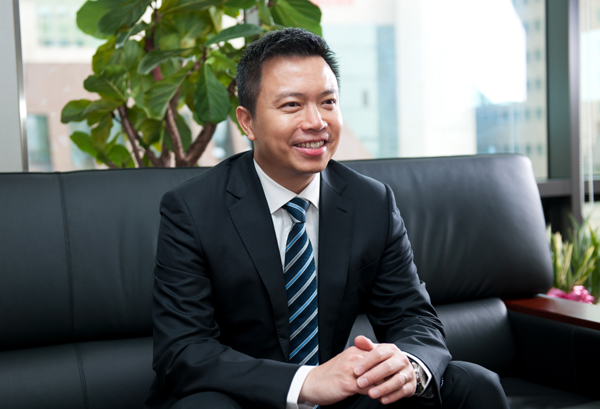It’s been some time that low birthrate became one of the most serious social and economic problems in Korea. Various medical and pharmaceutical firms have approached this issue from different angles.
Roche Diagnostics Korea’s answer was the “AMH test,” a critical tool for dealing with infertility, and another test on disease awareness on “Pre-eclampsia,” a kind of toxemia during pregnancy, reflecting how the local offshoot of the Swiss pharmaceutical giant adapts its business focus to host countries.
General Manager Richard Yiu expresses confidence about the growth potential of the Korean market, which belongs to the mature group, along with Japan and Australia, among the 16 countries in the Asia-Pacific region.
Roche Diagnostics Korea has also been selected as the “best employer of Korea” for the second consecutive year. Yiu, a Hong Kong citizen, has served as its chief throughout the period.
“Korea is the place to engage in a lot of studies to make innovations possible,” Yu told The Korea Biomedical Review in an interview at his office in Samseong-dong, southern Seoul, Friday.

Question: You have been in Korea for two years. How do you feel about your work?
Answer: I can use “two words” to describe it. One is “rewarding” because I can see the achievement we have made together. The second is “enriching” for the learning I have received as the general manager.
Since 2016, we wrote our 2020 vision for the company which is “leading innovation, growing together.” It means we need to be an innovation leader and be successful in this marketing environment. Also, we cannot be successful without growing together.
We are very proud that each of our three business units has launched many platforms and assays that helped laboratories to enhance their efficiency and quality for better quality healthcare.
Q: Roche Diagnostics Korea has been selected as the “best employer of Korea” for the second consecutive year. What is the key to getting this assessment?
A: The key is how the organization works, thinks and focus in a different manner. We are more focused on launching and identifying in our portfolio assays in improving standard care. Even if there is a low awareness of a certain disease, we are willing to invest and promote the availability in Korea.
Also, we are aiming to bring brand new platforms, meaning instruments, rapidly in Korea to help our customers to develop their lab service faster.
We have a more open attitude to government agencies like the Ministry of Food and Drug Safety, and Korea Medical Devices Industry Association. If they perform group activities, Roche is the leader among industries to participate. We don’t hesitate to give our real opinion, and we invite experts in different countries to exchange as well.
Q: You have been the Asian representative. What do you think about the disadvantages of the Korean market among Asian-Pacific countries?
A: The problem of the Korean market is aging population. The challenge is that our market growth rate is low single-digits that we need to overcome.
Q: The recent anti-Mullerian hormone (AMH) test was impressive. Childbirth interests are a necessary part of Korean society. Do you have any plans to release products related to women’s diseases? If so, please briefly explain about it.
A: The AMH test is a critical tool for infertility, and it is recommended for women 25 years of age, so they know when they will have difficulties in childbearing. Korean women marry and get pregnant later, so it’s critical to have this checkup.
One of our tests we recently performed was disease awareness on “Pre-eclampsia,” During the gestation period, around 3 percent of women over 35 years have this disease. The severity on Pre-eclampsia is serious because it is one of the three causes of death of pregnant women, mental problems of the baby and premature births.
It's hard to identify this disease because pregnant women have high blood pressure so it can be misrecognized as other diseases. Now the test can be a factual way to recognize and access on Pre-eclampsia.
Q: In Korea recently, interest in the field of vitro diagnostics is rising. From large corporations to venture companies, they are making inroads into the field in vitro diagnostics. What are your views on this issue?
A: I would encourage them; place them in more important roles in over-development of healthcare. Some 3-5 percent of healthcare resources are now using vitro diagnostics and 50-60 percent for clinical decisions. Engaging in this area would have a good future.
I would also always expect evidence. Usage of new equipment highly depends on data and tests these days are now rarely used manually. The company needs to have test publication platform to be used in clinical settings.
If the company is a startup, they should never overlook the importance of a partnership; it can support the development. Roche has a lot of global partnerships that brings new technology into the field.
Q: What is your plan?
A: We hope our people have a chance to develop some cultural changes. After years of working in Roche, people are free to express their opinions. We would like to gradually break barriers and see changes.
We want people to see Korea as a unique place in Asia-Pacific. On the other hand, Korea may not easily work in an international environment, and we would like to change that as well. We would like our employees to have more international exposure.
We are sending people to Singapore and Japan for a short assignment for three to six months. We are also going to receive people from Switzerland for an assignment as well.

